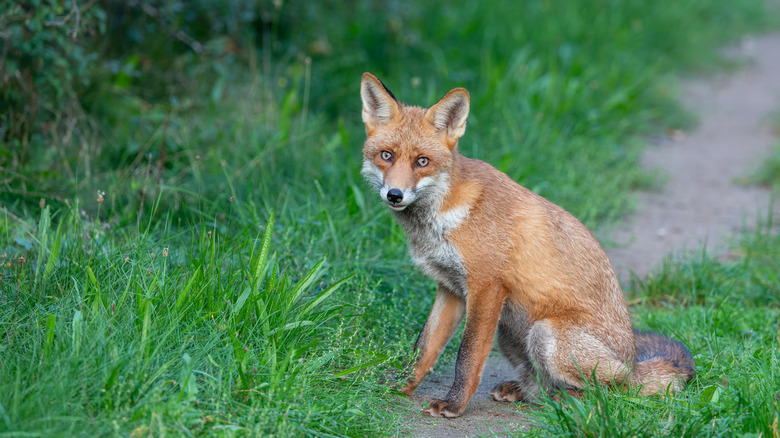How To Tell If A Fox Is Going To Attack And What To Do
You're heading home after a full day on the trails when you spot it: a flash of red, pointed ears, and a long fluffy tail. This is a fox. This little canine is no larger than a house cat — but is it dangerous? The short answer is no.
If you happen to spot a fox in a clearing, on city streets, or in your own backyard, you don't need to worry. In general, a fox will not attack you or your pets unprovoked. They are skittish animals and will almost always try to run away from perceived threats rather than fight.
Occasionally, there are reports of fox attacks, and exactly why these rare attacks occur is the subject of much discussion in the news, and is often debated by biologists and wildlife enthusiasts. Intriguingly, a study published in Human-Wildlife Interactions in 2020 found that the majority of fox attacks actually occur inside human homes, while a person is sleeping. These bites and scratches are believed to be the result of unusually bold foxes using their mouths and front paws to investigate a mysterious object — which turned out to be a sleeping person.
Rabies can make foxes attack
While a fox will almost never attack a human being, there is one potentially deadly exception: rabies. If a fox approaches you, either angrily or passively, it could be rabid — and a rabid fox may attack.
Mammals, including humans, can catch rabies. While recorded incidents of rabid foxes are uncommon, it does happen. In 2023, a rabid fox attacked several people on a street in Syracuse, New York, before being struck by a car (via Syracuse.com). There is no way to be 100% certain that an animal is rabid without lab testing, but if a fox, or any wild animal, is behaving unusually, there is a risk.
For some animals, simply being out in the daylight is a sign of potential rabies, but for foxes that isn't the case. Healthy foxes may come outside to hunt squirrels and birds, so seeing a fox in the daytime isn't a concern. If the fox is behaving like a drunk person, stumbling around or walking in circles, it may be rabid. If it seems to be partially paralyzed, is hurting itself seemingly on purpose, drooling, or snapping at nothing, it could have rabies. Fortunately, foxes almost never pass rabies to humans. Still, if a fox is behaving unusually, it's vital that you report it to local animal control and steer clear.
Will a fox attack pets?
In general, a fox is too small to attempt to fight a pet dog or hunt a pet cat (though one might try to eat a kitten if it was outside unprotected). It's possible that an outdoor cat could get in a fight with a fox, or a mother fox might attack a dog while defending her kits, but usually, you do not have to worry about a fox trying to take down your house pets.
However, if you have chickens or smaller pets that resemble its prey in the wild, like gerbils or rabbits, a fox would hunt them. Typically, a fox that is stalking its prey will get low to the ground as it sprints closer. It will hide in tall patches of grass and behind bushes. It may ambush its prey from its hiding place. If no cover is available, it will simply freeze completely when its subject looks towards it. When it is close enough, it will lunge forward with serious speed.
Responsible pet owners should avoid exposing their vulnerable pets to wildlife like foxes long before they are being stalked as prey, however. Pets should be kept inside, or in safe coops that foxes cannot get into.
Preventing conflicts
Fox attacks are rare, but foxes are still wild animals that should be treated with respect. The best way to avoid a fox attack is to give them space. It's never a good idea to approach a fox and try to pet it, no matter how cute they may be (especially as seeming tame can be a sign of rabies). A fox defending its babies is more likely to be aggressive, so if you happen to spot a den with kits, you should observe from a distance. Never try to touch the babies, and don't let your pets outside unattended, as curious cats and dogs may get into dens and be attacked by foxes.
You should also try not to attract foxes to your yard. Never feed a wild fox, and try not to leave food outside that they might be interested in. Foxes who are too comfortable around humans are more likely to be aggressive.



